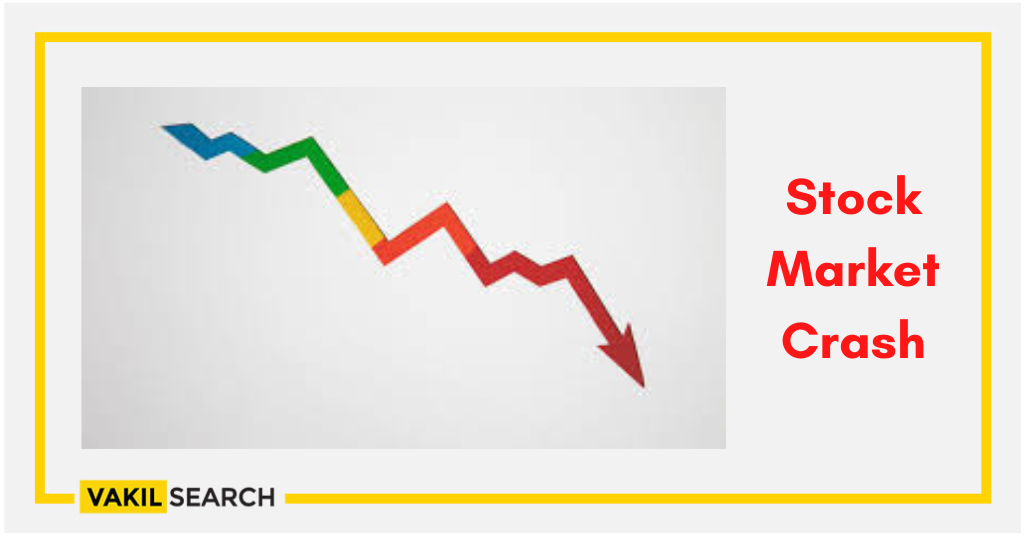Know the intricacies of stock market crashes in India. Understand their causes, identify early signs, know about major historical instances, and learn strategies to protect your investments.
This decline can happen quickly, causing widespread panic and selling among investors. The role of supply and demand is significant in a stock market crash India, as large numbers of investors selling stocks can cause a decrease in demand and lead to falling prices.
What is Stock Market Crash India?
A market correction is a less severe drop in the stock market than a crash, typically around a 10% decline. A correction is a natural part of the stock market cycle and can provide buying opportunities for investors, while a crash can have more significant and long-lasting economic consequences.
Role of Supply and Demand
Economic Factors
Overvalued Stocks: When stocks become overvalued, they can be at risk of a significant correction or crash.
Inflation: Rising inflation rates can reduce consumer spending and harm economic growth, leading to a decline in the stock market.
Interest Rates: High-interest rates can lead to decreased consumer spending and business investment, which can negatively impact the stock market.
High Debt Levels: Excessive debt levels can cause a decrease in confidence among investors and lead to this situation.
| Disclaimer: The information provided in this article is for general knowledge and is not intended to substitute professional financial advice. Vakilsearch does not encourage or endorse investing in the stock market or mutual funds based solely on the information provided in this article. The content of this article is intended solely for SEO optimisation purposes, and any information or opinions expressed herein should not be considered financial or investment advice. Before making any investment decisions, research and consulting with a qualified financial advisor who can provide personalised advice based on your financial situation and investment goals are important. Vakilsearch shall not be responsible or liable for any investment decisions made based on the information provided in this article. |
Political Factors
Wars and Conflicts: Political instability caused by wars or conflicts can lead to a stock market crash.
Government Policies: Changes in government policies, such as tax or regulatory policies, can significantly impact the stock market.
International Trade Tensions: Trade disputes between countries can harm global economic growth and lead to this situation.
Natural Disasters and Pandemics
Impact on Industries: Natural disasters or pandemics can disrupt industries and cause a decline in the stock market.
Disruption of Supply Chains: Supply chain disruptions caused by natural disasters or pandemics can lead to decreased economic activity .
Fear and Uncertainty: Fear and uncertainty caused by natural disasters or pandemics can cause investors to panic and sell their stocks, leading to a decrease in demand.
Consequences of a Stock Market Crash India Can Include
Economic Consequences
Recession: It can lead to a recession, causing a decrease in economic activity, job losses, and reduced consumer spending.
Job Losses: Companies may need to cut jobs to survive a stock market crash, increasing unemployment rates.
Reduced Consumer Spending: It can lead to a decrease in consumer confidence and a reduction in consumer spending.
Personal Consequences of a Stock Market Crash India
Loss of Savings: It can cause a decline in the value of individual investments, resulting in a loss of savings.
Retirement Plan Disruptions: It can significantly impact retirement plans, reducing retirement savings.
Increased Financial Stress: A stock market crash can cause significant financial stress for individuals and families, leading to anxiety and uncertainty about their financial future.
Preparing for a Stock Market Crash India Can Involve
Diversify your Portfolio: Spreading your investments across different sectors and asset classes can reduce risk exposure.
The importance of a balanced portfolio: A well-diversified portfolio can help you weather a stock market crash.
Invest in Defensive Stocks: Investing in defensive stocks, such as healthcare or utility companies, can provide some protection during a stock market downturn.
Examples of defensive stocks: Companies that produce essential goods and services, such as food or utilities, are typically less affected by economic downturns.
Have a Plan in Place: Developing an investment plan based on risk tolerance and financial goals can help you make informed decisions during market volatility.
The importance of sticking to your plan during market volatility: Avoiding making impulsive decisions during a stock market crash can help you avoid further losses and stay on
Conclusion
In conclusion, a Stock Market Crash India can have significant economic and personal consequences. However, investors can take steps to prepare for a market downturn and mitigate its impact on their portfolios.
FAQs on Stock Market Crash in India
What are some common reasons for stock market crashes in India?
Common reasons include economic slowdowns, high inflation rates, political instability, external global pressures, sudden policy changes, and financial scams.
What are the signs of an impending stock market crash in India?
Signs include rapid market overvaluation, extremely high price-to-earnings ratios, increased speculative activity, sudden spikes in stock borrowing, and significant economic indicators showing negative trends.
What are the key factors that trigger a stock market crash in India?
Key triggers encompass abrupt policy decisions by the government, revelations of major financial scams, sharp increases in interest rates, panic-driven selloffs, and major geopolitical events affecting the global economy.
How to safeguard investments during a stock market crash in India?
Investors can diversify their portfolios, maintain a long-term perspective, avoid panic selling, keep a cash reserve, consider safe-haven assets, and stay informed about market trends.
What are the historical examples of major stock market crashes in India?
Historical crashes include the 1992 securities scam involving Harshad Mehta, the 2008 global financial crisis that hit Indian markets, and the 2020 crash influenced by the COVID-19 pandemic.
Also, Read:

